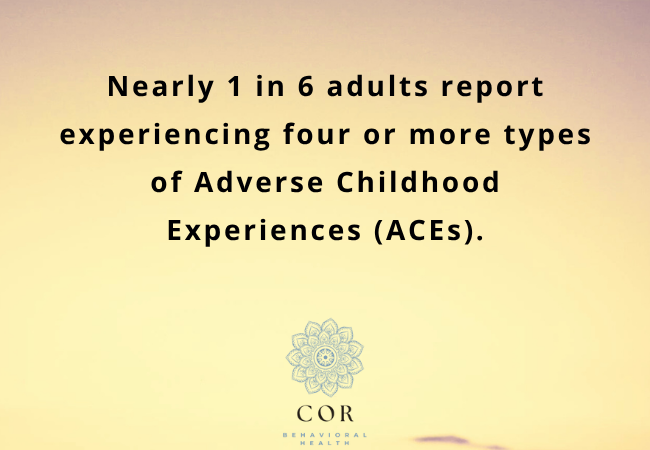
Trauma leaves an invisible imprint. It can change how you think, feel, relate to others, and view the world around you. While wounds like broken bones are easy to see, the emotional and psychological pain caused by trauma can linger for years—often buried beneath the surface. But healing is possible.
At COR Behavioral Health, our compassionate, evidence-based trauma treatment in Martin County, Florida is designed to help you feel safe again—in your body, your mind, and your relationships. In this blog, we’ll explore the leading trauma treatment approaches and how they rebuild the foundation of emotional safety and trust.
Understanding Trauma and Its Lasting Effects
Trauma isn’t defined by the event—it’s defined by the emotional response to that event. It might stem from:
- Childhood abuse or neglect
- Domestic violence
- Loss of a loved one
- Natural disasters
- Car accidents
- Sexual assault
- Medical trauma
- Military or first responder experiences
When trauma goes untreated, it can cause long-term psychological consequences, such as:
- PTSD (Post-Traumatic Stress Disorder)
- C-PTSD (Complex PTSD)
- Depression or anxiety
- Emotional numbness or hypervigilance
- Trust issues and relational difficulty
- Substance use as a coping mechanism
At COR Behavioral Health, we treat trauma in connection with other conditions through our Addiction and Mental Health Treatment Center in Martin County, Florida, offering holistic and trauma-informed care.
Why Safety Is the First Step in Trauma Recovery
Trauma disrupts the brain’s natural ability to feel safe—even in the absence of danger. It can leave people feeling trapped in “fight, flight, or freeze” mode, long after the traumatic event is over.
Rebuilding a sense of safety is the foundation of trauma recovery. This means:
- Feeling grounded and present in your body
- Trusting your environment and relationships
- Understanding and regulating your emotions
- Reclaiming control over your story and responses
Our trauma treatment in Martin County, Florida focuses on restoring that inner sense of stability using both clinical expertise and compassionate care.
Leading Trauma Treatment Approaches We Use
At COR Behavioral Health, we offer a wide range of evidence-based and trauma-informed therapies to support each client’s healing process.
1. Cognitive Behavioral Therapy (CBT)
CBT helps clients identify and challenge distorted thought patterns that stem from trauma. For example, thoughts like “I’m not safe” or “It was my fault” can be reframed with the help of a skilled therapist.
- Builds cognitive flexibility
- Reduces intrusive thoughts
- Strengthens coping strategies
This is a foundational therapy used in both individual therapy and group therapy in Martin County, Florida.
2. Trauma-Focused CBT (TF-CBT)
An adapted version of CBT specifically designed for trauma, especially in children, adolescents, and young adults. It includes:
- Psychoeducation about trauma and its effects
- Gradual exposure to trauma memories
- Developing a trauma narrative
- Emotional and behavioral regulation techniques
3. Eye Movement Desensitization and Reprocessing (EMDR)
EMDR uses bilateral stimulation (like eye movements or tapping) while recalling traumatic events, helping the brain “reprocess” the memory.
- Reduces the emotional charge associated with trauma
- Shown to be effective for PTSD, phobias, and grief
- Does not require extensive verbal processing of trauma
Our clinicians at COR Behavioral Health are EMDR-trained and use this method as part of advanced trauma treatment in Martin County, Florida.
4. Somatic Experiencing
This body-based therapy focuses on the physical sensations associated with trauma. Instead of reliving the story, clients are guided to notice where trauma “lives” in the body and gently release stored tension.
- Helps regulate the nervous system
- Reduces chronic physical symptoms (e.g., tight chest, stomach issues)
- Restores connection to the body and present moment
5. Mindfulness-Based Therapies
Mindfulness techniques are used throughout trauma treatment to help clients:
- Stay grounded in the present
- Learn to observe thoughts without judgment
- Build emotional tolerance and awareness
Mindfulness is woven into individual therapy in Martin County, Florida as well as our Intensive Outpatient Program (IOP) and Partial Hospitalization Program (PHP).
6. Dialectical Behavior Therapy (DBT)
Originally developed for people with high emotional sensitivity or trauma backgrounds, DBT teaches skills like:
- Emotion regulation
- Distress tolerance
- Interpersonal effectiveness
- Mindfulness
DBT is used across both individual and group sessions at COR Behavioral Health and is especially effective for those with C-PTSD, mood disorders, or self-harm behaviors.
Rebuilding Safety Through Structured Support
Healing from trauma doesn’t happen in isolation. At COR Behavioral Health, we offer multiple levels of care based on each individual’s needs:
Partial Hospitalization Program (PHP)
- Daily therapeutic structure without full hospitalization
- Ideal for clients needing intensive support for trauma, depression, and co-occurring conditions
- Includes individual therapy, group therapy, medication management, and wellness practices
Intensive Outpatient Program (IOP)
- 3–5 days a week of support with flexible scheduling
- Focuses on skill-building, emotional processing, and reintegration into daily life
- A powerful step for individuals transitioning from higher care or needing more than weekly therapy
Our PHP and IOP in Martin County, Florida are trauma-informed and provide stability, consistency, and care to help clients feel safe enough to process and grow.
Understanding the Neurobiology of Trauma
Trauma changes the way the brain works. The amygdala (the fear center) becomes overactive, while the prefrontal cortex (decision-making) can become less active. The hippocampus—responsible for processing memories—may shrink or become dysregulated.
These changes explain why trauma survivors often experience:
-
Flashbacks
-
Memory fragmentation
-
Chronic hypervigilance
-
Difficulty concentrating or feeling safe
At COR Behavioral Health, our trauma-informed providers understand these neurological changes and use therapies designed to rewire and regulate the brain.
How Trauma Impacts Relationships
Unresolved trauma can strain personal and professional relationships. Survivors may:
-
Struggle with trust or attachment
-
React with anger, withdrawal, or fear
-
Experience emotional numbness
-
Fear abandonment or intimacy
In treatment, clients learn to:
-
Understand trauma’s impact on attachment
-
Rebuild healthy boundaries
-
Communicate with greater clarity and confidence
-
Re-establish safety in connection with others
We offer relational and family-focused approaches within our trauma programs and group therapy in Martin County, Florida.
Trauma-Informed Care in PHP and IOP
Our Partial Hospitalization Program and Intensive Outpatient Program in Martin County, Florida provide structured care in a trauma-informed setting. This means:
-
Staff are trained to recognize trauma responses
-
Clients are never forced to recount trauma before they’re ready
-
The environment prioritizes choice, safety, trust, and empowerment
In these programs, therapy sessions are carefully paced, and clients are treated as partners in their healing—not passive patients.

How Trauma Treatment Supports Whole-Person Healing
In addition to processing traumatic experiences, we address related conditions, including:
- Anxiety: We provide anxiety treatment in Martin County, Florida to help clients manage panic, worry, and hypervigilance.
- Depression: Trauma often leads to emotional numbness or despair. Our depression treatment in Martin County, Florida helps restore hope and motivation.
- Bipolar Disorder: Trauma can complicate mood stability. We offer bipolar treatment in Martin County, Florida integrated with trauma care.
- Addiction and Dual Diagnosis: Many use substances to numb trauma symptoms. Our Addiction and Mental Health Treatment Center in Martin County, Florida provides dual-diagnosis support.
What Healing Looks Like
Trauma recovery is different for everyone, but many clients describe:
- Feeling more grounded and present
- Less emotional reactivity
- Improved sleep and physical well-being
- Renewed ability to trust and connect
- Clearer thinking and reduced flashbacks
- Increased confidence and peace
At COR Behavioral Health, healing isn’t just about reducing symptoms—it’s about reclaiming your sense of self.
Why Choose COR Behavioral Health for Trauma Recovery
- Licensed trauma-informed clinicians with advanced training in EMDR, CBT, DBT, and somatic practices
- Customized treatment plans based on each client’s history, needs, and readiness
- Safe, inclusive, and respectful care environment
- Full continuum of care including outpatient, IOP, and PHP options
- Support for co-occurring conditions like addiction, anxiety, depression, and bipolar disorder
Conclusion
If trauma has left you feeling unsafe in your body, relationships, or mind, you’re not alone—and you don’t have to navigate it by yourself. With the right treatment, you can find safety again. And from that safety, healing can grow.
Call COR Behavioral Health today at 888.231.7973 to learn more about trauma treatment in Martin County, Florida and begin your path toward peace, empowerment, and emotional freedom.
Frequently Asked Questions (FAQs)
What types of trauma do you treat at COR Behavioral Health?
We treat a wide range of trauma, including childhood abuse, domestic violence, sexual assault, medical trauma, grief, PTSD, and complex trauma. Our approach is personalized to your experience.
What therapy methods are used to treat trauma?
We offer evidence-based therapies including CBT, Trauma-Focused CBT, EMDR, DBT, Somatic Experiencing, and Mindfulness-Based Therapy—all focused on helping you regain control and emotional safety.
Do I have to talk about my trauma in detail to heal?
Not necessarily. Methods like EMDR and somatic therapies allow you to process trauma without reliving or verbally recounting every detail. We move at your pace.
What if I have other conditions like anxiety or addiction?
We offer integrated treatment for trauma alongside anxiety, depression, bipolar disorder, and substance use disorders through our Addiction and Mental Health Treatment Center in Martin County, Florida.
Are PHP and IOP programs appropriate for trauma recovery?
Yes. Our Partial Hospitalization Program (PHP) and Intensive Outpatient Program (IOP) provide trauma-informed care in a structured, supportive setting—ideal for those needing more than weekly therapy.



